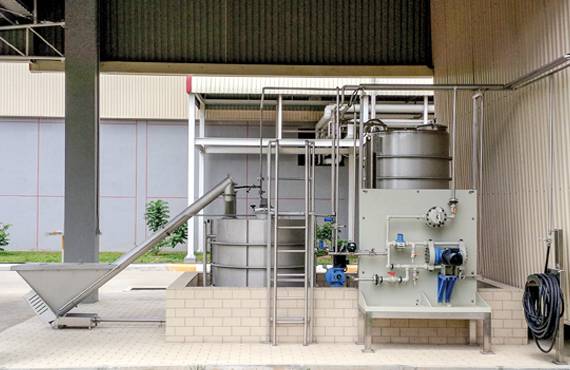Currently caustic soda is stored in fiberglass stainless steel carbon steel low carbon steel lined steel and plastic materials.
Caustic soda storage tank design.
Liquid caustic soda is corrosive.
Terminals are used to maintain.
The nature of the service environment including the temperature and concentration will largely determine which materials are most appropriate.
Substances able to be stored may include caustic soda or sodium hydroxide.
Home chemical storage sodium hydroxide defying a chemical that finds leaks.
Caustic soda is shipped via pipelines tank trucks railcars barges and ships.
Tank inlet should be above the highest anticipated tank level with an inlet dip pipe which extends below the lowest anticipated tank level to prevent splashing of the caustic soda solution.
The water should be lukewarm 80 100 f 27 38 c.
Due to the dynamic nature of chemical storage and chemical processes it is important.
Never start with hot or cold water.
Always add caustic soda solution to water with constant agitation.
Also known as caustic soda or liquid lye sodium hydroxide is used to adjust ph in water and wastewater treatment and in the manufacture of chemicals rayon cellophane pulp and paper aluminum detergents soaps and a wide range of other products.
Our in house design and engineering teams work with you and our resin suppliers to ensure you have a properly designed caustic tank.
Most caustic soda tanks offered by plastic storage tank distributors are made from polyethylene.
Never add water to the caustic soda solution.
If these elevated temperatures are required tank annealing and or naoh resistant corrosion barrier coatings should be considered to counteract potential tank damage.
Storage temperatures for caustic tanks should be beneath 100 f for polyethylene tanks and beneath 120 f for carbon steel tanks.
Choose design tanks for your next tank project.
For 50 caustic storage a design specific gravity of 1 6 is recommended because caustic soda is difficult to pump when the temperature gets to 60f storage tanks must be heated or kept in a warm room.
If you look at an impartial chemical compatibility guide you will find that polyprolypene is a much better choice for caustic tanks.
The addition of caustic soda to liquid will cause a rise in temperature.
Service selected will depend upon such factors as size and location of storage rate of consumption plant location freight rates etc.
Looking for a caustic tank solution.
That is not the best choice if you are storing caustic tanks are storing concentrations of 50 or higher.
Because tanks in caustic soda service will have a specific gravity greater than 1 0 the ul 142 code is not acceptable.

